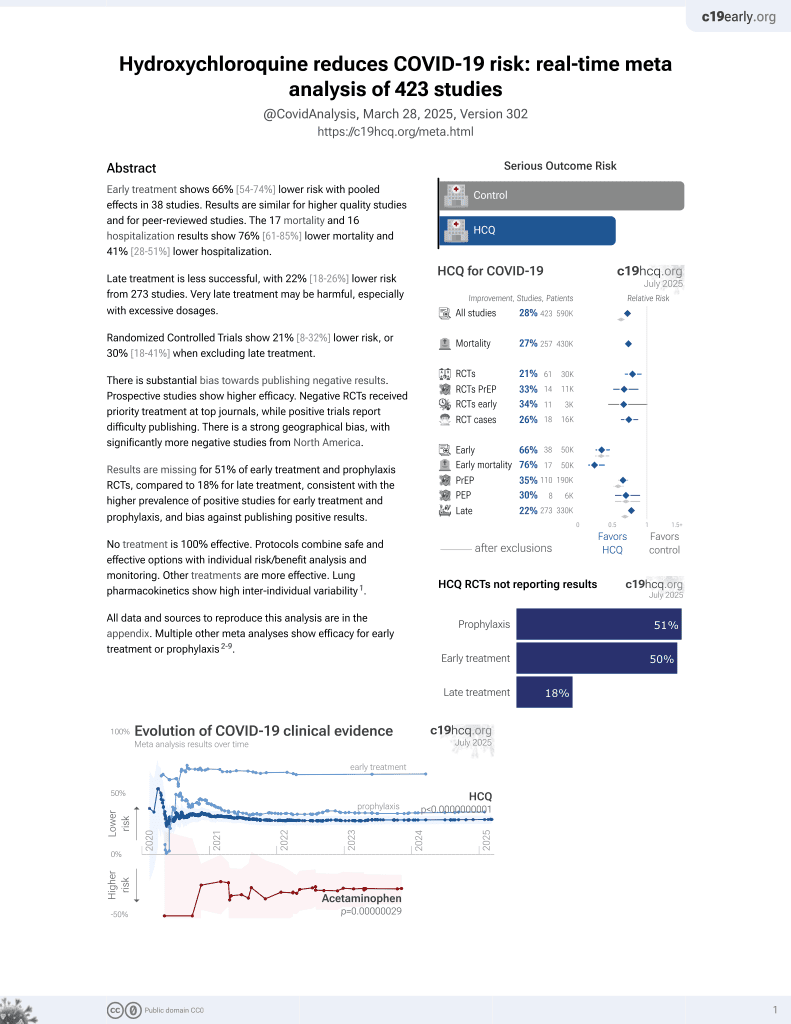
Falsification of chloroquine antimalarials: realities and methods of detection
, A., Актуальні питання створення нових лікарських засобів: матеріали XXIX міжнар. наук.-практ.конф. молодих вчених та студентів, м. Харків, 19-21 квіт. 2023, 118-119, Apr 2023
HCQ for COVID-19
1st treatment shown to reduce risk in
March 2020, now with p < 0.00000000001 from 424 studies, used in 59 countries.
No treatment is 100% effective. Protocols
combine treatments.
6,400+ studies for
210+ treatments. c19early.org
|
Discussion of falsified chloroquine and proposals for detection. Author reports that antimalarial drugs, particularly chloroquine, represent an estimated 9.5% of all falsified antimalarials globally, affecting countries across Africa, Asia, and Europe, with the problem exacerbated by complex global supply chains and e-commerce platforms that facilitate distribution of unauthorized medicines. Author reviews WHO reports on substandard medicines and proposes analytical methods for detecting chloroquine falsification.
Oujnin et al., 19 Apr 2023, peer-reviewed, 1 author.
FALSIFICATION OF CHLOROQUINE ANTIMALARIALS: REALITIES AND METHODS OF DETECTION
Introduction. Up to two billion people around the world lack access to necessary medicines, vaccines, medical devices including in vitro diagnostics, and other health products, which creates a vacuum that is too often filled by substandard and falsified products. This problem is growing as global supply chains become more complex, meaning products manufactured in one country may be packaged in a second country and distributed across borders to be marketed or sold to consumers in a third. The growth of e-commerce also contributes to this trend by making it easier to purchase medicines online, often from unauthorized sources. The World Health Organization (WHO) has identified this issue as one of the urgent health challenges for the next decade, given that more than one in ten medicines in low-and middle-income countries are estimated to be substandard or falsified. No country remains untouched from this issue, and WHO has received reports of substandard or falsified medical medicines, vaccines and in vitro diagnostics from all regions of the world. Both generic and innovator medicines can be falsified, ranging from costly products for cancer to very inexpensive products for treatment of pain. Antimalarial medicines, such as chloroquine drugs, are among the most reported substandard and falsified medical products (9.5% of all antimalarials) in countries of Africa, Asia and even Europe. Among the medicines that were subject to counterfeiting were chloroquine drugs, which were distributed worldwide, including to Burkina Faso, Cameroon, Democratic Republic of Congo, France, and Niger. Aim. To consider the problem of falsification of chloroquine medicines and to select methods for the tasks of forensic pharmaceutical research. Materials and methods. For this case study, we reviewed WHO reports on substandard or falsified medicines and documents from judicial and pharmaceutical cases on methods for determining chloroquine in medicines that are suspected of being falsified. Results and discussion. Chloroquine phosphate or sulfate is referenced on the WHO Model List of Essential Medicines for the treatment of Plasmodium vivax infection (malaria). Large clinical trials are under way to generate the robust data needed to establish the efficacy and safety of chloroquine and hydroxychloroquine in the treatment of COVID-19. These medicines are currently authorized for malaria and certain autoimmune diseases, and it is important that patients do not face shortages caused by stockpiling or use outside the authorized indications. Both chloroquine and hydroxychloroquine can have serious side effects, especially at high doses or when combined with other medicines. Therefore, to ensure the circulation of quality, safe and effective chloroquine tablets with consistent and predictable therapeutically active pharmaceutical ingredients, such quality assessment studies are necessary tools. Because they can provide an insight into the quality of these products circulated..
